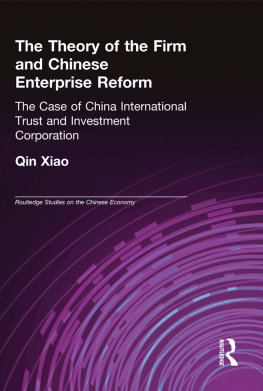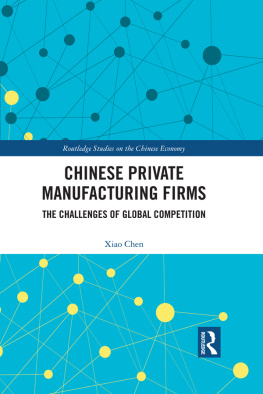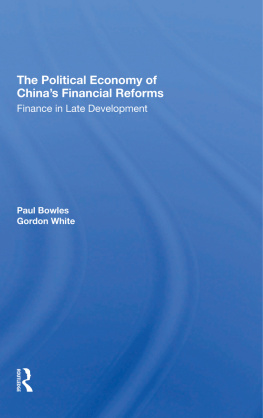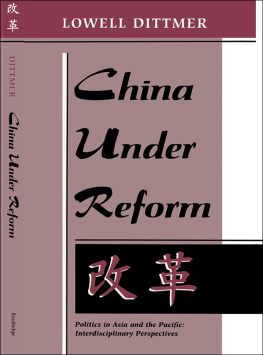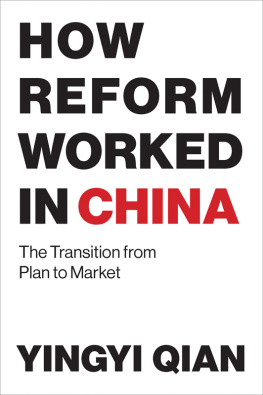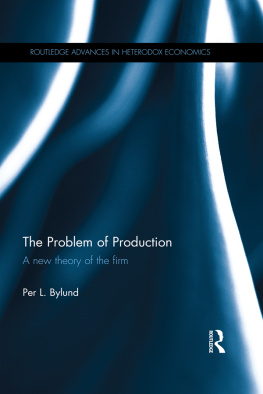The Theory of the Firm and Chinese Enterprise Reform
Changes to corporate structure, including the role of the corporate headquarters, have been key factors in bringing about economic reform in China. In this penetrating and insightful book, Dr Qin Xiao, inspired by the new institutional economists and his personal experience as President of CITIC, a well-known Chinese large business group, questions the conventional theory of the firm, arguing that the ultimate goal of the headquarters of modern large corporations is to function as a substitution for the market, and introducing a new explanation for the nature of the firm the substitution function model. He provides an insiders account of the reforms in CITIC, a rare narrative that should be essential reading for scholars and practitioners who care about the theory and practice of the firm, in particular in the context of Chinese enterprise reform.
Qin Xiao has been Chairman of China Merchant Group Limited and China Merchants Bank since 2001. Before that, he was Vice Chairman and President of China International Trust and Investment Corporation (CITIC), and Chairman of CITIC Industrial Bank. He is a member of the APEC Business Advisory Council (ABAC) and was Chair of ABAC in 2001. Dr Qin Xiao is also a member of Toyotas International Advisory Board. He holds a PhD in economics from the University of Cambridge, and serves as an Honorary Professor at the Business School of Tsinghua University and the Graduate School of the Peoples Bank of China. He is the author of several papers and books in the fields of economics and management, and a keynote speaker at various international fora, such as APEC.
RoutledgeCurzon studies on the Chinese economy
Series Editors
Peter Nolan, University of Cambridge
Dong Fureng, Beijing University
The aim of this series is to publish original, high-quality, research-level work by both new and established scholars in the West and the East, on all aspects of the Chinese economy, including studies of business and economic history.
The Growth of Market Relations in Post-reform Rural China
A micro-analysis of peasants, migrants and peasant entrepreneurs Hiroshi Sato
The Chinese Coal Industry: An Economic History
Elspeth Thomson
Sustaining Chinas Economic Growth in the Twenty-first Century
Edited by Shujie Yao and Xiaming Liu
Chinas Poor Regions
Ruralurban migration, poverty, economic reform and urbanisation Mei Zhang
Chinas Large Enterprises and the Challenge of Late Industrialization
Dylan Sutherland
Chinas Economic Growth
Yanrui Wu
The Employment Impact of Chinas World Trade Organisation Accession
A.S. Bhalla and S. Qiu
Catch-Up and Competitiveness in China
The case of large firms in the oil industry Jin Zhang
Corporate Governance in China
Jian Chen
The Theory of the Firm and Chinese Enterprise Reform
The case of China International Trust and Investment Corporation Qin Xiao
The Theory of the Firm and Chinese Enterprise Reform
The Case of China International Trust and Investment Corporation
Qin Xiao
First published 2004 by Routledge Curzon
This edition published 2013 by Routledge
2 Park Square, Milton Park, Abingdon, Oxon OX14 4RN
Simultaneously published in the USA and Canada by Routledge
711 Third Avenue, New York, NY 10017
Routledge is an imprint of the Taylor & Francis Group, an informa business
2004 Qin Xiao
Typeset in Times by Florence Production Ltd, Stoodleigh, Devon
All rights reserved. No part of this book may be reprinted or reproduced or utilized in any form or by any electronic, mechanical, or other means, now known or hereafter invented, including photocopying and recording, or in any information storage or retrieval system, without permission in writing from the publishers.
British Library Cataloguing in Publication Data
A Catalogue record for this book is available from the British Library
Library of Congress Cataloguing in Publication Data
A catalog record for this book has been requested
ISBN 0415336554
To my mother
and in memory of my father
Crucial to determining the future international competitive capability of indigenous Chinese firms is whether these firms will prove able to adopt and adapt advanced management techniques to optimize their efforts across the value chain. Dr Qin Xiaos book brings rigorous management thinking to the Chinese case and grounds this analysis in an insiders view of one of the most important firms created early in the reform era, the China International Trust and Investment Corporation. Qin Xiaos combination of deep understanding of both Western management theory and of actual Chinese practice makes this an important work of scholarship.
Kenneth Lieberthal
William Davidson Professor of
International Business and Corporate Strategy
University of Michigan Business School
This is a remarkable book by an exceptional author Dr Qin Xiao has produced a most interesting study concerning the policy of the headquarters of large corporations. This is not a subject on which a great deal has been written so far and it is therefore all the more valuable.
Dr Qin Xiao brings to his task exceptional qualifications. He is a noted theoretical economist and as one-time President of CITIC he has added to his academic qualifications deep practical knowledge. This book represents an invaluable addition to the subject and I am sure that it will repay close study.
Lord Roll of Ipsden KCMG, CB
Senior Advisor of the Union Bank of Switzerland (UBS)
This important study of the emergence of the modern Chinese corporation is written from the unique perspective of a successful entrepreneur turned management theorist. Dr Qin Xiaos surprising conclusion is that management problems in China result more from misconceptions about market economies than from the legacies of the planned economy. By clarifying these misconceptions, he has made a valuable contribution both to scholarship and to Chinas economic reforms. His fascinating and detailed case study of CITIC alone is worth the price of the book.
Professor Susan L. Shirk
Institute of Global Conflict and Cooperation
University of California, San Diego
A remarkable study. Dr Qin Xiao, based on his own experience as one of Chinas most prominent businessmen, here makes a triple contribution. This work provides an innovative theoretical analysis of managerial objectives; an informative case study of one of Chinas most dynamic enterprises, CITIC; and a subtle critique of Chinas industrial reform strategy. Any one of these would be sufficient reason to read this book; together they make it an extremely rewarding experience.
Barry Naughton
Sokwanlok Professor
Graduate School of International Relations and Pacific Studies
University of California, San Diego
Peter Nolan *
In 1976, China began the long march toward system transformation and integration with the global economy. This prolonged and complex process reached a highly significant new stage when China joined the World Trade Organization in 2001 following many years of negotiations. In the sharpest contrast with the process in the USSR, Chinas system reform has been slow and experimental, characterized as groping for stones to cross the river. China has decisively left one bank of the river, the old administratively planned, economic system. However, the opposite bank is still only dimly visible. Many people assume that the country will move steadily toward the free market, and that Chinas political economy will increasingly approximate that of the United States. However, it is not at all clear that this is the case. The country is still groping for a way forward to construct a political economic system appropriate to the countrys complex needs in the early twenty-first century, but which builds on Chinas own rich history and achievements (Nolan 2003).

